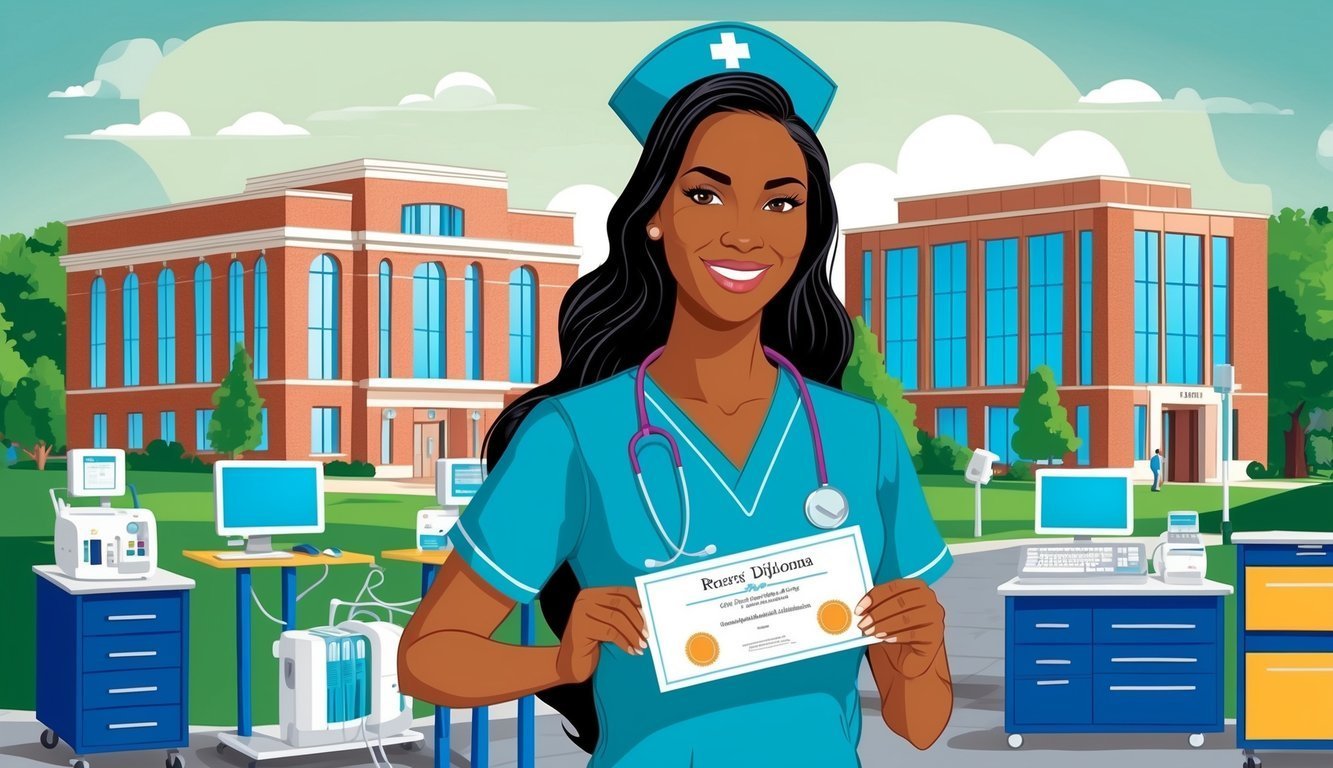Transitioning from a licensed practical nurse (LPN) to earning a Bachelor of Science in Nursing (BSN) is an excellent way to enhance your nursing career.
This academic advancement not only broadens your knowledge and skills but also significantly improves your job prospects and potential salary.
The LPN to BSN pathway allows you to build upon your existing expertise while preparing you for more complex roles in healthcare.
As healthcare evolves, so do the roles and responsibilities of nurses.
Completing a BSN can lead to increased opportunities in specialized fields, management positions, and even advanced practice roles.
Many programs are designed with flexibility in mind, allowing you to balance your work commitments while pursuing further education.
Resources like Nursing.org offer valuable insights into top LPN to BSN programs available, helping you make informed decisions about your career advancement.
Investing in a BSN can be a pivotal step in your nursing journey.
You take on greater challenges and responsibilities, positioning yourself as a leader in the nursing profession.
Consider exploring the various LPN to BSN programs to find the one that best fits your goals and lifestyle.
Exploring LPN to BSN Bridge Programs
Transitioning from an LPN to a BSN provides an opportunity for career advancement in nursing.
Understanding the structure and requirements of these bridge programs can significantly aid your journey.
Understanding the LPN to BSN Pathway
The LPN to BSN pathway is designed for Licensed Practical Nurses seeking to become Registered Nurses with a Bachelor of Science in Nursing.
This pathway typically shortens the duration of study compared to traditional BSN programs.
Most programs offer a combination of online and in-person courses to accommodate working professionals.
You will engage with advanced nursing concepts, including patient care, public health, and leadership skills.
Programs can be completed in as little as nine months to two years.
Each program may vary, so it’s crucial to research specific offerings and how they align with your career goals.
Admission Requirements and Application Process
Admission requirements for LPN to BSN programs generally include:
| Requirement | Details |
|---|---|
| LPN License | Valid and active LPN license required. |
| Transcripts | Official transcripts from all post-secondary institutions. |
| Prerequisite Courses | Completion of courses in subjects like anatomy, microbiology, and psychology. |
| Standardized Tests | Some programs may require tests like the TEAS. |
| Application Fees | Fees vary by institution, often around $60. |
The application process usually involves submitting an online application along with the required documents by specific deadlines.
These deadlines can differ, so you should check each program’s timeline to ensure timely submission.
Curriculum Overview
The curriculum in LPN to BSN programs typically includes core nursing courses, along with general education subjects.
Key areas of focus may involve:
- Nursing Theory: Understanding foundational nursing concepts.
- Clinical Practice: Hands-on training in various healthcare settings.
- Pathophysiology: Studying disease processes and their impacts on health.
- Leadership and Management: Developing skills necessary for supervisory roles.
In addition, many programs feature electives in specialized areas such as pediatrics, geriatrics, or mental health.
Before enrolling, review the curriculum thoroughly to ensure it meets your educational and career objectives.
For a comprehensive list of program options, you may consider visiting the NursingProcess.org website.
Academic Components of BSN Education

The academic components of a Bachelor of Science in Nursing (BSN) program are designed to provide a comprehensive foundation in nursing.
You will encounter a blend of core courses, clinical experience, and advanced nursing concepts that are essential for professional practice.
Core Nursing Courses and Specializations
Core nursing courses form the backbone of your BSN education.
You will typically take classes such as nursing fundamentals, pathophysiology, pharmacology, and health assessment.
Each course focuses on critical areas required for safe and effective patient care.
| Course Name | Description | Credit Hours |
|---|---|---|
| Nursing Fundamentals | Introduces basic nursing concepts and skills | 3 |
| Pathophysiology | Explores disease processes and their effects on the body | 3 |
| Pharmacology | Covers medication types and their effects | 3 |
| Health Assessment | Teaches techniques for assessing patient health | 3 |
Many programs also offer specializations, allowing you to focus on areas like pediatrics, geriatrics, or mental health nursing.
Specializations can enhance your job prospects and enable you to provide more targeted patient care.
Clinical and Theoretical Foundations
Successful nursing practice integrates clinical and theoretical knowledge.
In this part of your education, you will engage in clinical rotations in various healthcare settings.
This practical experience allows you to apply what you have learned in the classroom to real-life situations.
Courses typically include both lectures and labs.
For instance, while studying health assessment, you will learn theoretical concepts and then practice them during simulation labs.
These experiences are crucial for understanding patient care and improving your clinical skills.
Advanced Nursing Concepts
As you progress in your BSN program, you will encounter advanced nursing concepts.
Topics will include leadership, healthcare policy, and community health.
These courses prepare you to think critically and advocate for your patients and the nursing profession.
Assignments may include case studies, research projects, and group presentations.
You will develop skills in critical thinking and evidence-based practice, which are vital for nursing leaders.
Programs often challenge you to consider the social determinants of health and ethical issues in nursing, making you a well-rounded practitioner.
Clinical Practicum and Experience
In the journey from LPN to BSN, clinical practicum and hands-on experience play a crucial role.
You will engage in various clinical placements that enhance your skills and prepare you for advanced nursing roles.
Clinical Hours and Requirements
You must complete specific clinical hours to meet the requirements of your LPN to BSN program.
Typically, programs mandate around 500 to 700 clinical hours.
These hours consist of direct patient care and observational experiences in a variety of healthcare settings.
Your clinical placements will span across different specialties, ensuring a well-rounded educational background.
You may encounter settings like hospitals, clinics, and community health organizations.
Maintaining an unencumbered RN license in your state is often a prerequisite.
This ensures that you are qualified to perform clinical practices safely and effectively.
Hands-On Clinical Experience
Hands-on clinical experience is fundamental in bridging theoretical knowledge with real-world nursing practice.
During your clinical rotations, you will work alongside experienced nurses and healthcare professionals.
These experiences provide you with opportunities to apply nursing concepts in patient care situations.
Common tasks may include administering medications, performing assessments, and developing care plans.
Each clinical rotation can enhance your skills in diverse environments, such as pediatrics, geriatrics, and mental health.
You will gain invaluable insights into patient interactions, teamwork, and communication in a healthcare setting.
Mentorship and Professional Development
Mentorship is an integral part of your clinical experience.
You will often be paired with a preceptor who guides you through the intricacies of patient care.
This relationship fosters professional growth and enhances your confidence in applying nursing skills.
Additionally, regular feedback from your mentor will help you identify areas for improvement.
Engaging in discussions about case studies and ethical dilemmas promotes critical thinking and decision-making skills.
Consider taking advantage of networking opportunities during your clinical hours.
Building professional relationships can lead to future job placements or recommendations in your nursing career.
Licensing and Professional Practice
Navigating the transition from Licensed Practical Nurse (LPN) to a Bachelor of Science in Nursing (BSN) involves critical steps that include preparing for the NCLEX-RN, understanding the transition to a registered nurse, and meeting state board requirements.
Each of these steps is essential for obtaining your nursing license and advancing your career.
Preparing for the NCLEX-RN
The National Council Licensure Examination for Registered Nurses (NCLEX-RN) is a pivotal step in your nursing career.
As you complete your BSN program, focus on mastering key nursing concepts, clinical skills, and patient care strategies.
Consider utilizing NCLEX-RN review courses and study guides to enhance your preparation.
Practice questions and simulations can help you become familiar with the exam format.
Additionally, maintaining a study schedule will ensure you cover essential topics thoroughly.
Here are important topics to focus on:
| Category | Examples |
|---|---|
| Safe and Effective Care | Patient safety protocols |
| Health Promotion | Disease prevention strategies |
| Psychological Integrity | Mental health support |
| Management of Care | Leadership and delegation |
Transition to Registered Nurse
Transitioning to a Registered Nurse (RN) role requires more than just passing the NCLEX-RN.
You will need to adapt to new responsibilities, including patient management and more complex decision-making processes.
In your BSN program, seek opportunities for clinical rotations that expose you to various specialties, such as pediatrics, geriatrics, and emergency care.
This exposure not only enhances your skills but also helps you build a professional network.
Consider joining nursing organizations or student groups that can provide mentorship and resources.
These connections will be beneficial as you enter the workforce.
State Board Requirements
Each state has specific licensing requirements governed by its Board of Nursing.
Familiarize yourself with the regulations in your state, as these can vary significantly.
Key elements often include:
- Application Process: Submit an application to the state board, including proof of education and clinical hours.
- Background Checks: Most states require criminal background checks as part of the licensure process.
- Fees and Examinations: Be prepared to pay licensing fees and sit for any required exams.
Ensure your program is accredited and meets your state’s educational requirements for licensure.
You can find more information on state-specific regulations at the NCSBN website.
Advancement and Opportunities for BSN Graduates

Earning a Bachelor of Science in Nursing (BSN) opens the door to numerous career prospects for you as a nurse.
This degree not only expands your employment opportunities but also positions you for leadership roles and further education.
Employment Opportunities and Job Market
With a BSN, you significantly enhance your employment prospects.
Many healthcare employers, including hospitals and clinics, prefer or require a BSN for registered nurse (RN) positions.
| State | Annual Job Openings |
|---|---|
| California | 23,850 |
| New York | 22,730 |
| Texas | 19,880 |
| Florida | 18,680 |
These numbers reflect just a few states where opportunities are plentiful.
Graduates can expect roles in various settings, including public health, community hospitals, and specialty clinics.
Leadership Roles and Further Education
A BSN prepares you for advanced roles in nursing.
These include leadership positions, such as nursing management, education, or clinical practice.
Many healthcare institutions look for RNs with BSNs.
They need them for roles that involve mentorship or administrative functions.
A BSN also provides a solid foundation for pursuing graduate education.
This can lead to master’s or doctoral degrees, broadening your scope of practice and leadership potential.
The Impact of Higher Education on Nursing
The transition from LPN to BSN can significantly influence your career trajectory.
Research indicates that RNs with a BSN earn substantially more than those with only an associate degree.
On average, BSN-prepared nurses earn around $86,520 compared to $72,000 for those with an ADN.
This wage difference enhances your financial stability and reflects the growing demand for higher qualifications in nursing.
Institutions such as the Higher Learning Commission recognize the importance of advanced education in improving patient outcomes and healthcare quality.
As a BSN graduate, you are better positioned to address complex healthcare needs and lead initiatives that impact health communities.

